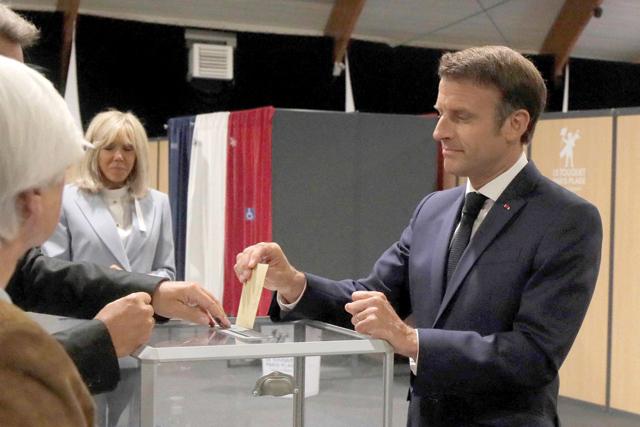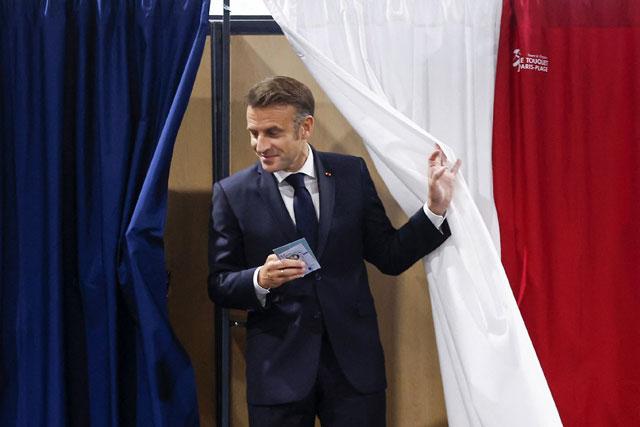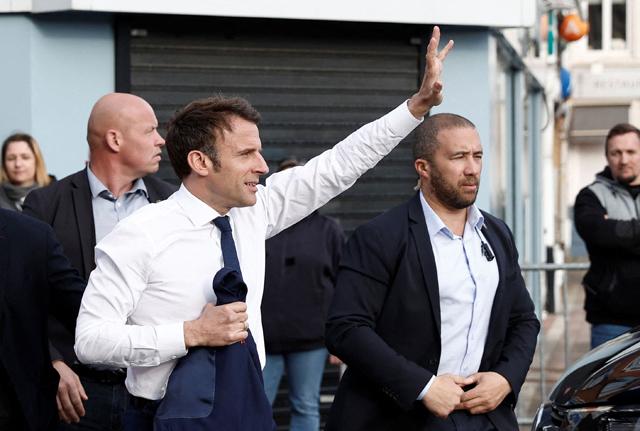You are here
Macron battles French left in tight parliament election
By AFP - Jun 19,2022 - Last updated at Jun 19,2022

France's President Emmanuel Macron casts his ballot next to his wife Brigitte Macron during the second stage of French parliamentary elections at a polling station in Le Touquet, northern France, on Sunday (AFP photo)
PARIS — French President Emmanuel Macron on Sunday faced a challenge from a newly formed left-wing alliance in parliamentary elections that could see his centrist coalition lose its overall majority.
The vote will be decisive for Macron's second-term agenda following his reelection in April, with the 44-year-old needing a majority to secure promised tax cuts and welfare reform and raise the retirement age.
Polls have suggested his "Together" coalition is on course to be the biggest party in the next national assembly, but possibly short of the 289 seats needed for a majority.
New left-wing coalition NUPES is hoping to spring a surprise, with the red-green collective promising to block Macron's agenda after uniting behind 70-year-old figurehead Jean-Luc Melenchon.
Turnout, seen as crucial to the outcome of the vote, was at 38.11 per cent with three hours of voting to go, down on the 39.42 per cent recorded in the first round on June 12 at the same stage, although up on the 35.33 per cent recorded in 2017, the interior ministry said.
Meanwhile, polling firms predicted that abstention rates would be between 53.5 per cent and 54 per cent, higher than the 52.5 per cent recorded in the first round.
Analysts had said a higher-than-expected turnout would most likely favour NUPES, which is banking on young people and the working classes voting.
Falling short of the majority would force Macron into tricky alliances with other parties on the right to force through legislation.
The nightmare scenario for the president — seen as unlikely although not impossible — would be the left winning a majority and Melenchon heading the government.
"The vote is extremely open and it would be improper to say that things are settled one way or the other," Melenchon told reporters on Friday during a final campaign stop in Paris.
Macron was left disappointed last weekend after the first round placed Together and NUPES neck-and-neck in the popular vote at around 26 per cent.
The first-round vote served to whittle down candidates in most of the country's 577 constituencies to two finalists who are going head-to-head on Sunday.
Far-right leader Marine Le Pen is also eyeing major gains for her National Rally Party, which had just eight seats in the outgoing parliament.
Macron cast his ballot in northern seaside town Le Touquet alongside his wife Brigitte, while Melenchon voted in Mediterranean port city of Marseille.
The contest between Together and NUPES has turned increasingly bitter over the last week, with Macron’s allies seeking to paint their main opponents as dangerous far-leftists.
Senior MP Christophe Castaner has accused Melenchon of wanting a “Soviet revolution”, while Economy Minister Bruno Le Maire called him a “French [Hugo] Chavez” after the late Venezuelan autocrat.
Macron headed to Ukraine last week, hoping to remind voters of his foreign policy credentials and one of Melenchon’s perceived weaknesses — his anti-NATO and anti-EU views at a time of war in Europe.
As president, he would retain control of foreign and defence policy whatever the outcome, but his domestic agenda would be thwarted if his party lost control of parliament.
Macron had before embarking on the trip called on voters to hand his coalition a “solid majority”, adding “nothing would be worse than adding French disorder to the world disorder”.
Melenchon has promised a break from “30 years of neo-liberalism” — meaning free-market capitalism — and has pledged minimum wage and public spending hikes, as well as nationalisations.
It has been 20 years since France last had a president and prime minister from different parties, when right-winger Jacques Chirac had to work with a Socialist-dominated parliament under premier Lionel Jospin.
A final flurry of polls Friday suggested Macron’s Together allies were on track for 255-305 seats Sunday, with only the upper end of that range being a majority of more than 289.
“I saw that 60-70 per cent of young people don’t vote. I find that incredible... we are the ones who can change things,” said Lena Laurent, a producer in the film industry, of the low turnout.
In France’s Caribbean island of Guadeloupe — where the poll is held a day early — Justine Benin was defeated by NUPES candidate Christian Baptiste Saturday, a loss that jeopardises her role in the government as Secretary of State for the Sea.
On the mainland, France’s Europe Minister Clement Beaune and Environment Minister Amelie de Montchalin are facing tough challenges in their constituencies, with both likely to exit government if defeated.
Related Articles
PARIS — French voters turned out in large numbers Sunday for the final round of a high-stakes election that is expected to leave the far-rig
PARIS — French President Emmanuel Macron embarked Monday on a final fortnight of campaigning against his far-right rival Marine Le Pen for a
PARIS — French President Emmanuel Macron has won reelection with a relatively comfortable majority, but his battle with far-right leader Mar


















